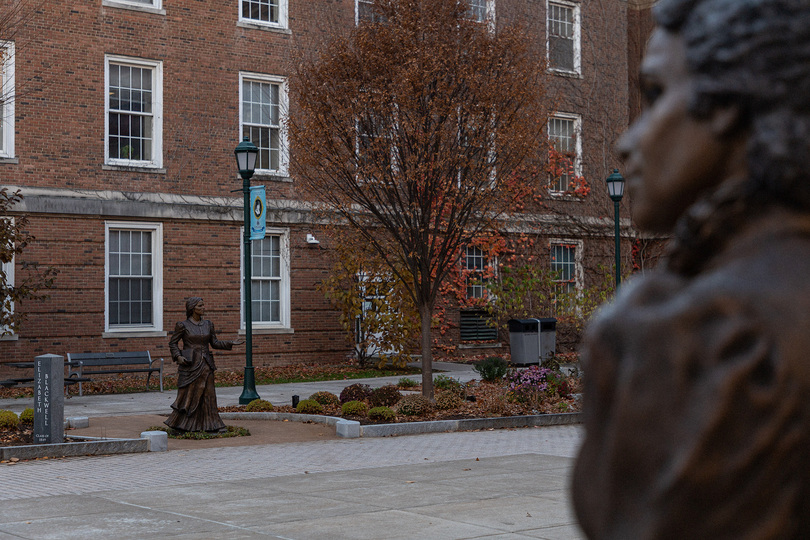‘Founding Mothers’ courtyard statues honor SUNY Upstate’s women in medicine

A century after Elizabeth Blackwell and Sarah Lougen Fraser attended SUNY Upstate, their legacies live on in the new “Founding Mothers” courtyard. On Oct. 23, statues were unveiled to honor the two women’s influence in the medical field. Joe Zhao | Senior Staff Photographer
Get the latest Syracuse news delivered right to your inbox.
Subscribe to our newsletter here.
Over a century after Elizabeth Blackwell and Sarah Lougen Fraser attended SUNY Upstate Medical University, their legacy lives on at the school, using their stories as motivation to keep pushing for representation in the medical field.
On Oct. 23, SUNY Upstate unveiled statues of influential women in the medical field at the newly titled “Founding Mothers” courtyard. Bronze statues of Blackwell and Lougen Fraser now greet students and staff as they walk into the university.
Students, faculty and staff gathered to honor the legacy of these two alumnae in a “very permanent way,” fourth-year medical student Amelia Gabor said.
Blackwell was the first woman in the United States to receive a medical degree and the first woman to graduate from SUNY Upstate in 1849, named Geneva Medical College at the time. She was originally admitted as a joke, as the men at the university doubted she would accept the admission, Gabor said.
“They didn’t believe she belonged there; they thought it would be the funniest joke to have a woman in their class, and you know, she was able to tune all of that noise out and get her job done, get her degree and excel at it,” Gabor said.
Graduating at the top of her class, Blackwell was dedicated to broadening the effectiveness of medical care in the U.S. and had a great impact on the role of women in public health, Dr. Lynn Cleary, a professor at SUNY Upstate, said.
Lougen Fraser was the fourth Black woman in the U.S. to receive a medical degree and the first to graduate from SUNY Upstate in 1876, then called Syracuse University College of Medicine. Later in life, she moved to the Dominican Republic and became the first female doctor to serve there.
Coming from an underrepresented background, third-year medical student Schlyer Turner said Lougen Fraser’s ability to run a free clinic in the Dominican Republic for those without adequate health care really resonated with her.
She said the women faced prejudice and discrimination during their time at the university, but pushed forward and made a lasting impact.
“I hope people can take away from their stories that anyone can be anything they want to be, as long as you have the drive, the commitment, and the passion for it,” Turner said. “There are people like Dr. Lougen Fraser who have already done it. So why can’t you?”
At the unveiling ceremony, Gabor said she expected faculty and administration to be present, as they know more about the women and their history at the school.
However, she said she was especially touched by the number of students who joined. Many told her they were proud to be a part of such an event and have such influential women part of their school’s history.
“Medical students are so busy, but to see that so many take time out of their day to watch this happen says a lot about the values of a lot of our students,” she said.
Cleary said the idea to recognize these women first began on Feb. 3, 2021, to honor Blackwell’s 200th birthday. She said SUNY Upstate wanted to do something special to honor her bicentennial, and the idea of a statue stuck.
SUNY Upstate President Mantosh Dewan thought they should also use this opportunity to honor Lougen Fraser.
The artist of these statues, Carolyn Palmer, wanted the women’s statues to be very welcoming, human and real, Cleary said. Lougen Fraser’s right hand and Blackwell’s left hand gesture toward the entrance of the university.
Gabor said she appreciates how personable the statues are and thinks they connect well with people who see them.
“Today I actually saw a physician walk to one of the statues and just shake her hand, and then he kept going with his day,” Gabor said.
Since the time of these women, the commitment to gender and racial equity has evolved, not only at SUNY Upstate but throughout the world, Cleary said. More women and people of color have been admitted to medical school over time.
Cleary said the university has taken that legacy seriously, attempting to recruit and matriculate a diverse class.
Both Blackwell and Lougen Fraser serve as role models and inspirations for not only women in the medical field but for all, reminding people of the importance of bravery and perseverance, Cleary said.
“We are so happy to have them arrive on campus and join us, and be part of the inspiration for anybody who comes here, learning their stories and learning the history of women in medicine,” Cleary said.





